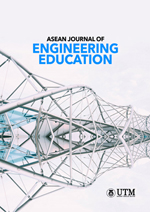An Affective Cognitive Teaching and Learning Framework in Engineering Education
Abstract
The affective aspect of learning (feeling, emotion, and attitude) tends to be relatively less appreciated in engineering education compared to the cognitive aspect of learning, although numerous studies support the importance of the affective dimension in facilitating the effective cognitive processes and the internalization of cognitive knowledge. Lack of appreciation of the affective dimension often results in undervaluing the students’ potential which leads to poorer realization of students’ achievement. One of the factors that may contribute to this phenomenon is the lack of a teaching and learning model for supporting the utilization of the affective dimension in the teaching for cognitive learning. Therefore, this paper proposes an affective‐cognitive framework based on the proposed study for teaching and learning in engineering education that integrates the affective aspects of learning into teaching and learning activities. The affective aspects namely, self‐efficacy, locus of control and attitude has been identified from existing knowledge on personality traits as being important in promoting learning. It is expected that the integrated approach can be used as a guideline by engineering educators in designing effective and sustainable instructional materials that would result in effective engineers for future development.


















